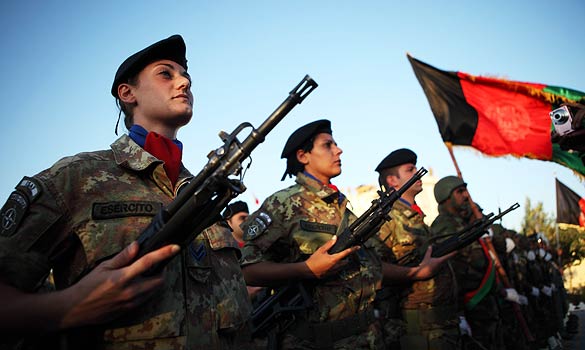When ten French soldiers were killed last year in an ambush by Afghan insurgents in what had seemed a relatively peaceful area, the French public were horrified.
Their revulsion increased with the news that many of the dead soldiers had been mutilated — and with the publication of photographs showing the militants triumphantly sporting their victims’ flak jackets and weapons. The French had been in charge of the Sarobi area, east of Kabul, for only a month, taking over from the Italians; it was one of the biggest single losses of life by Nato forces in Afghanistan.
What the grieving nation did not know was that in the months before the French soldiers arrived in mid-2008, the Italian secret service had been paying tens of thousands of dollars to Taleban commanders and local warlords to keep the area quiet, The Times has learnt. The clandestine payments, whose existence was hidden from the incoming French forces, were disclosed by Western military officials.
– The Italian Job (Times)
– United States admits tackling Italians over payments to the Taleban (Times)
– French killed after Italy bribed Taliban: report (AFP)
– ‘NATO troops paying for peace in Afghanistan’ (AFP)
Italian soldiers with the Nato-led International Security Assistance Force at a compound run in Herat. Silvio Berlusconi said that his Government “has never authorised or allowed any payment”
A Taleban commander and two senior Afghan officials confirmed yesterday that Italian forces paid protection money to prevent attacks on their troops.
After furious denials in Rome of a Times report that the Italian authorities had paid the bribes, the Afghans gave further details of the practice. Mohammed Ishmayel, a Taleban commander, said that a deal was struck last year so that Italian forces in the Sarobi area, east of Kabul, were not attacked by local insurgents.
The payment of protection money was revealed after the death of ten French soldiers in August 2008 at the hands of large Taleban force in Sarobi. French forces had taken over the district from Italian troops, but were unaware of secret Italian payments to local commanders to stop attacks on their forces and consequently misjudged local threat levels.
Mr Ishmayel said that under the deal it was agreed that “neither side should attack one another. That is why we were informed at that time, that we should not attack the Nato troops.” The insurgents were not informed when the Italian forces left the area and assumed they had broken the deal. Afghan officials also said they were aware of the practice by Italian forces in other areas of Afghanistan.
A senior Afghan government official told The Times that US special forces killed a Taleban leader in western Herat province a week ago. He was said to be one of the commanders who received money from the Italian Government. A senior Afghan army officer also repeated the allegation, adding that agreements had been made in both Sarobi and Herat.
The report prompted the French Opposition to demand an urgent explanation to parliament, describing the details as “very serious”. The Defence Ministry said that it was aware of “rumours” that linked bribery to the ambush but claimed that the reports had no basis.
In Rome, Ignazio La Russa, the Defence Minister, insisted the allegations were “absolute rubbish”. He said: “I had been minister for a short time [in the summer of 2008], I’ve never received news from the secret services of payment to the chiefs of the Taleban.”
The minister added that a benevolent attitude toward the Italians who serve in Afghanistan had nothing to do with alleged bribes, but was due, instead, to “the behaviour of our military, which is very different compared to that of other contingents”.
A statement released by the office of Silvio Berlusconi, the Italian Prime Minister, also denied the claims. “The Berlusconi Government has never authorised nor has it allowed any form of payment toward members of the Taleban insurgency,” it said.
Neither, the statement continued, did it know of any such payment by the previous Government.
Mr Berlusconi was elected for a third non-consecutive term in April 2008, replacing the centre-left Government headed by Romano Prodi.
The statement pointed out that in the first half of last year the Italian contingent suffered “several attacks”, including in the Sarobi district where one soldier, Francesco Pezzulo, was killed in February 2008.
The US Embassy in Rome declined to confirm or to deny the report that US officials issued a démarche, an official complaint, to the Italian Government over alleged payments to insurgents in June 2008.
A spokesman said that the embassy “does not comment on internal diplomatic conversations that may or may not have occurred”.
The Italian Defence Ministry confirmed on Wednesday that the US Government had raised the issue of payments to insurgents, but said that it was not a formal protest, but rather an “informal request for information” about such payments.
Mr Prodi also denied knowledge of the alleged payments to local insurgents.
He told The Times: “This is the first time I have ever heard such accusations and I can say that there is no base for them. I know absolutely nothing of this.”
Fabio Evangelisti, of the opposition Italy of Values party, said: “The details of the case, charged by The Times, appear per se to be serious and worthy of maximum attention and assessment by our Government. The ready denials of Ministers La Russa and Rotondi are not sufficient to dissipate the doubts and insinuations about our military operations.”
October 16, 2009
Tom Coghlan
Source: The Times
